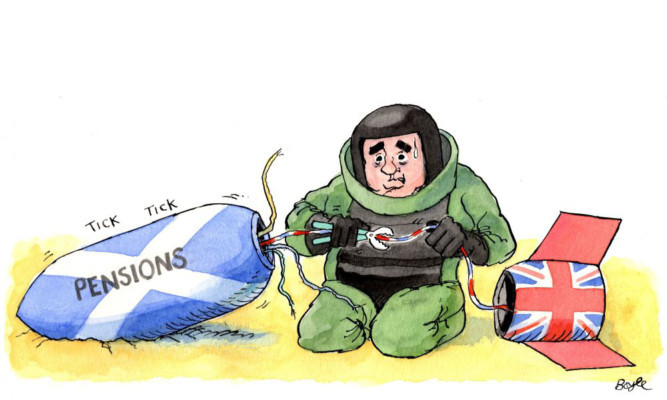
Uncertainty as ever surrounds pensions in an independent Scotland but are the risks worth it?
It should come as no surprise that there is much uncertainty about the issue of pensions in an independent Scotland. After all, the entire pensions industry is built on uncertainty around how much will investments return, how much do you have to invest to get a decent living in retirement and ultimately how long each of us will live.
Life expectancy in Scotland remains slightly lower than the rest of the UK. That’s why the SNP have said they’ll review Westminster plans to hike the retirement age to 68 over the next 30 years or so. They want to stop at 66. That’s going to cost, like many of the Scottish Government’s plans for pensions.
According to the White Paper they want to increase the state pension by £1.10 more than currently planned by Westminster and they’d continue the triple-lock which guarantees pensions rise either in line with average earnings, inflation or 2.5%, whichever is higher.
Scotland has proportionately more pensioners than the rest of the UK. Chief Secretary to the Treasury Danny Alexander was perhaps first to lob the demographic time bomb into the debate when he appeared before a House of Lords select committee in 2012 to unveil Treasury analysis showing how the Scottish population is ageing faster than the UK.
That’s particularly pertinent around the issue of pensions.
Scotland would face a higher pensions bill earlier this year Gordon Brown put it at around £9 billion or three times North Sea oil revenues with fewer people to pay it.
Bear in mind it’s not the case that National Insurance is paid into a pot from which we draw our pensions. Pensions are what’s known as an “unfunded liability” on the state. They are paid each year out of the general taxation. No tax comes in, no pensions would be paid out.
Crucially though, all sides agree that the state pension is safe.
Economist Alice Enders of Enders Analysis said: “For Scotland’s pensioners eligible for or already receiving the statutory state pension, independence will not change their situation as has been confirmed by the UK Pensions Minister Steve Webb.”
Critics claim that the Scottish Government has not explained how it would pay for the higher pensions bill, but the answer seems fairly clear in the White Paper. It states the Scottish Government’s “long term target must be to grow our working age population in line with the projected increase in those dependent on it”. Most likely that means immigration.
According to the Treasury, the number of people in a city the size of Edinburgh would have to be added to the population over the next 20 years to generate the tax to make up the funding gap.
The demographic challenge applies to paying public-sector pensions too but the Scottish Government says they will be guaranteed.
Alice Enders adds: “In the White Paper, the Scottish Government states that it will protect all accrued public sector pension rights, which is to be expected since the Scottish Government is campaigning for independence and would not wish to disadvantage their faithful troops.”
Private pensions face challenges too.
Assuming Scotland gets into the EU then Brussels rules would kick in demanding that cross-border pension schemes that are set up on a defined benefit basis are fully funded. The average deficit for all such schemes is £35 million. The Scottish Government says a grace period would be negotiated to give those funds time to balance the books. However, earlier this year the EU rejected proposals to relax the rules. Some critics claim Scottish members of those schemes, assuming they make up the minority, would be simply kicked out.
Then there’s the question of regulation.
Enough pension schemes have gone belly up over the years to show that good regulation is vital. The Scottish Government says it will set up a Scottish regulator that would work with the UK bodies. And for those whose funds have collapsed in the past and now receive payments from the Pensions Protection Fund 24,000 Scots they say current arrangements should continue or they could set up a separate Scottish body though funding for that from a smaller pool would be an issue.
The crux of the issues around pensions come down to cost and risk. How would Scotland pay for improved state pensions and would extra regulation put up the cost of private schemes? And would schemes be at more risk in an independent Scotland given the EU rules of cross-border schemes and questions around the Pensions Protection Fund?
Independence, like pensions, is bound to carry risks and costs the question is whether what you get back at the end of it proves worth it.

Enjoy the convenience of having The Sunday Post delivered as a digital ePaper straight to your smartphone, tablet or computer.
Subscribe for only £5.49 a month and enjoy all the benefits of the printed paper as a digital replica.
Subscribe